情态动词+have done的用法+练习
- 格式:ppt
- 大小:132.00 KB
- 文档页数:6
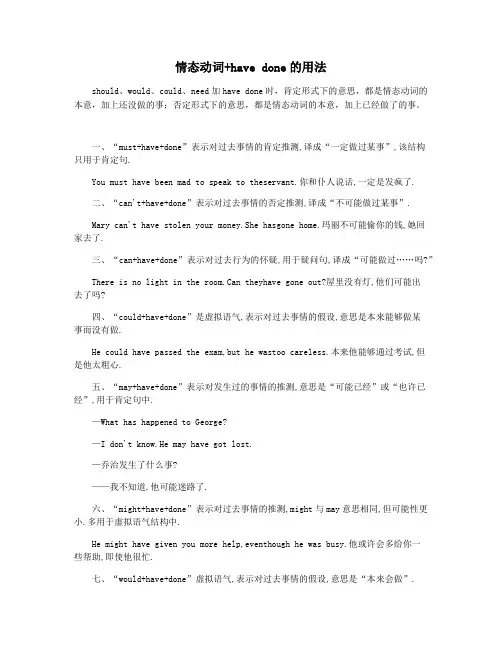
情态动词+have done的用法should、would、could、need加have done时,肯定形式下的意思,都是情态动词的本意,加上还没做的事;否定形式下的意思,都是情态动词的本意,加上已经做了的事。
一、“must+have+done”表示对过去事情的肯定推测,译成“一定做过某事”,该结构只用于肯定句.You must have been mad to speak to theservant.你和仆人说话,一定是发疯了.二、“can't+have+done”表示对过去事情的否定推测,译成“不可能做过某事”.Mary can't have stolen your money.She hasgone home.玛丽不可能偷你的钱,她回家去了.三、“can+have+done”表示对过去行为的怀疑,用于疑问句,译成“可能做过……吗?”There is no light in the room.Can theyhave gone out?屋里没有灯,他们可能出去了吗?四、“could+have+done”是虚拟语气,表示对过去事情的假设,意思是本来能够做某事而没有做.He could have passed the exam,but he wastoo careless.本来他能够通过考试,但是他太粗心.五、“may+have+done”表示对发生过的事情的推测,意思是“可能已经”或“也许已经”,用于肯定句中.—What has happened to George?—I don't know.He may have got lost.—乔治发生了什么事?——我不知道,他可能迷路了.六、“might+have+done”表示对过去事情的推测,might与may意思相同,但可能性更小.多用于虚拟语气结构中.He might have given you more help,eventhough he was busy.他或许会多给你一些帮助,即使他很忙.七、“would+have+done”虚拟语气,表示对过去事情的假设,意思是“本来会做”.Without your help,I wouldn't haveachieved so much.没有你的帮助,我是不会取得如此大的成绩.八、“should+have+done”意思是“本来应该做某事,而实际没做.”“shouldn't+have+done”表示本来不应该做某事,而实际做了.含有指责对方或自责的含意.Look,Tom is crying.I shouldn't have beenso harsh on him.看,汤姆哭了,我本来不应该对他如此严厉.九、“ought to+have+done”表示过去应该做而实际并没有做,译成“理应做……”,往往表示遗憾.与“should+have+done”用法基本一样.I ought to have gone home last Sunday.我理应上星期日回家.十、“need+have+done”表示本来需要做某事而没有做.“needn't+have+done”则表示“本来不需要做某事而做了”.I needn't have bought so much wine—only fivepeople came.我本来没有必要买这么多酒,只来了五个人.感谢您的阅读,祝您生活愉快。
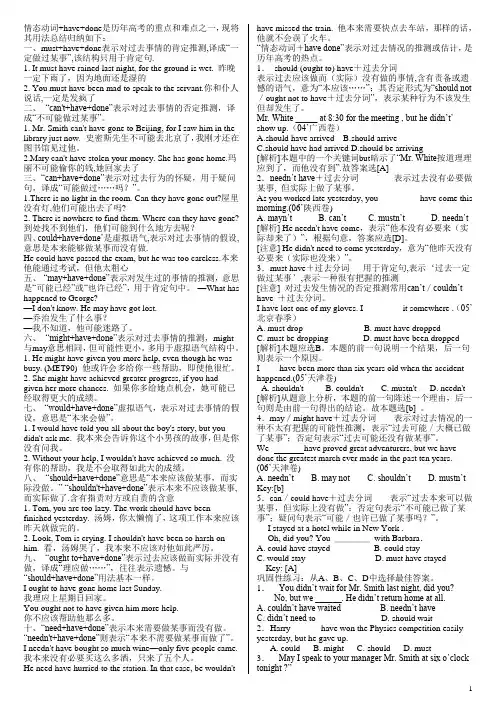
情态动词+have+done是历年高考的重点和难点之一,现将其用法总结归纳如下:一、must+have+done表示对过去事情的肯定推测,译成“一定做过某事”,该结构只用于肯定句.1. It must have rained last night, for the ground is wet. 昨晚一定下雨了,因为地面还是湿的2. You must have been mad to speak to the servant.你和仆人说话,一定是发疯了二、“can't+have+done”表示对过去事情的否定推测,译成“不可能做过某事”。
1. Mr. Smith can't have gone to Beijing, for I saw him in the library just now. 史密斯先生不可能去北京了,我刚才还在图书馆见过他。
2.Mary can't have stolen your money. She has gone home.玛丽不可能偷你的钱,她回家去了三、“can+have+done”表示对过去行为的怀疑,用于疑问句,译成“可能做过……吗?”。
1.There is no light in the room. Can they have gone out?屋里没有灯,他们可能出去了吗?2. There is nowhere to find them. Where can they have gone? 到处找不到他们,他们可能到什么地方去呢?四、could+have+done’是虚拟语气,表示对过去事情的假设,意思是本来能够做某事而没有做.He could have passed the exam, but he was too careless.本来他能通过考试,但他太粗心五、“may+have+done”表示对发生过的事情的推测,意思是“可能已经”或“也许已经”,用于肯定句中。
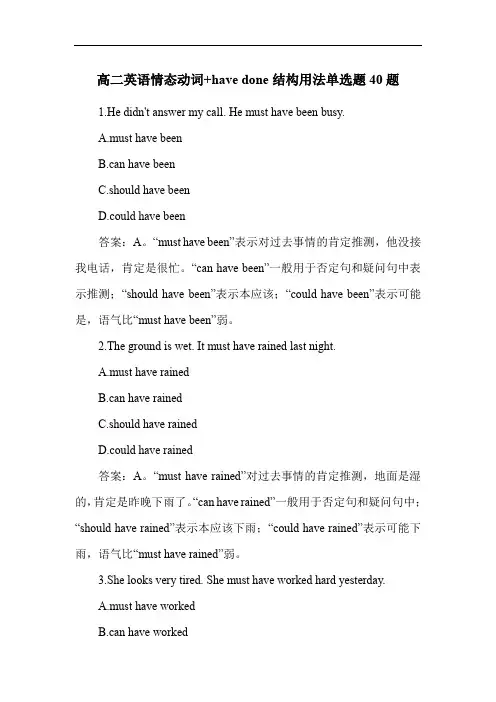
高二英语情态动词+have done结构用法单选题40题1.He didn't answer my call. He must have been busy.A.must have beenB.can have beenC.should have beenD.could have been答案:A。
“must have been”表示对过去事情的肯定推测,他没接我电话,肯定是很忙。
“can have been”一般用于否定句和疑问句中表示推测;“should have been”表示本应该;“could have been”表示可能是,语气比“must have been”弱。
2.The ground is wet. It must have rained last night.A.must have rainedB.can have rainedC.should have rainedD.could have rained答案:A。
“must have rained”对过去事情的肯定推测,地面是湿的,肯定是昨晚下雨了。
“can have rained”一般用于否定句和疑问句中;“should have rained”表示本应该下雨;“could have rained”表示可能下雨,语气比“must have rained”弱。
3.She looks very tired. She must have worked hard yesterday.A.must have workedB.can have workedC.should have workedD.could have worked答案:A。
“must have worked”对过去事情的肯定推测,她看起来很累,肯定是昨天努力工作了。
“can have worked”一般用于否定句和疑问句中;“should have worked”表示本应该工作;“could have worked”表示可能工作,语气比“must have rained”弱。
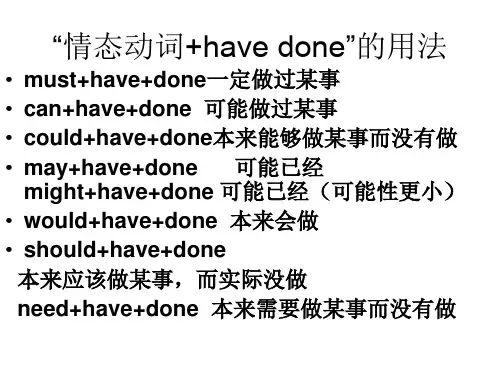

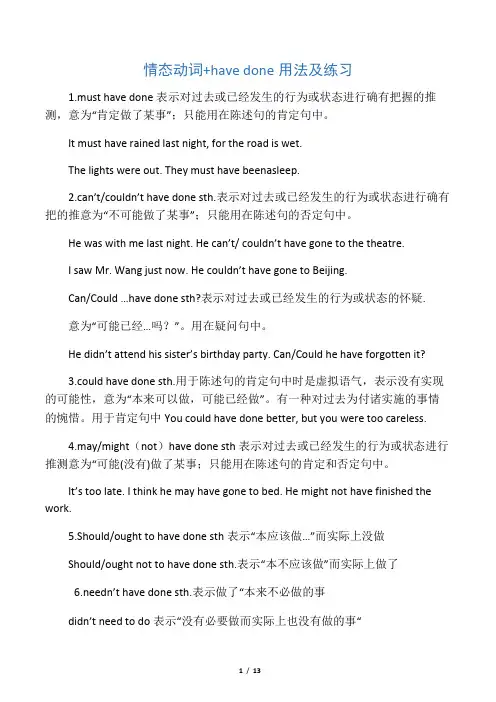
情态动词+have done用法及练习1.must have done表示对过去或已经发生的行为或状态进行确有把握的推测,意为“肯定做了某事”;只能用在陈述句的肯定句中。
It must have rained last night, for the road is wet.The lights were out. They must have beenasleep.2.can’t/couldn’t have done sth.表示对过去或已经发生的行为或状态进行确有把的推意为“不可能做了某事”;只能用在陈述句的否定句中。
He was with me last night. He can’t/ couldn’t have gone to the theatre.I saw Mr. Wang just now. He couldn’t have gone to Beijing.Can/Could …have done sth?表示对过去或已经发生的行为或状态的怀疑.意为“可能已经…吗?”。
用在疑问句中。
He didn’t attend his sister’s birthday party. Can/Could he have forgotten it?3.could have done sth.用于陈述句的肯定句中时是虚拟语气,表示没有实现的可能性,意为“本来可以做,可能已经做”。
有一种对过去为付诸实施的事情的惋惜。
用于肯定句中You could have done better, but you were too careless.4.may/might(not)have done sth表示对过去或已经发生的行为或状态进行推测意为“可能(没有)做了某事;只能用在陈述句的肯定和否定句中。
It’s too late. I think he may have gone to bed. He might not have finished the work.5.Should/ought to have done sth表示“本应该做…”而实际上没做Should/ought not to have done sth.表示“本不应该做”而实际上做了6.needn’t have done sth.表示做了“本来不必做的事didn’t need to do表示“没有必要做而实际上也没有做的事“You needn’t have taken a taxi here, for it was verynear to my house.I didn’t need to clean the windows. My brother did it.7.had better have done sth.用于事后的建议,含轻微的责备的口吻,意为“当时最好做了某事“,其否定形式had better not have done sth表达相反的含义。
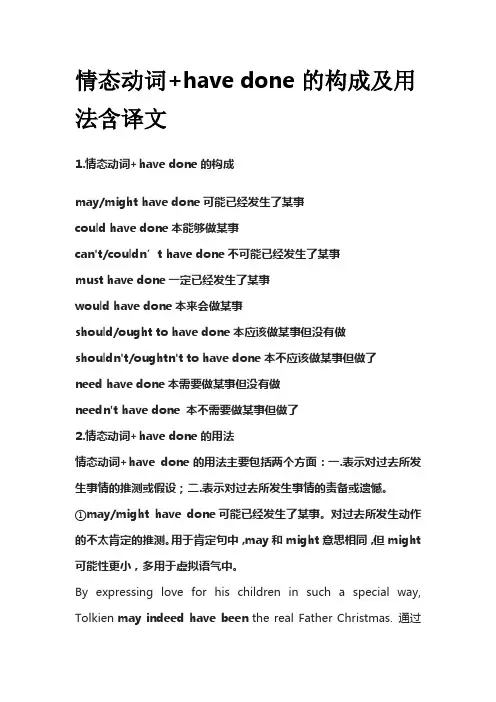
情态动词+have done的构成及用法含译文1.情态动词+have done的构成may/might have done可能已经发生了某事could have done本能够做某事can't/couldn’t have done不可能已经发生了某事must have done一定已经发生了某事would have done本来会做某事should/ought to have done本应该做某事但没有做shouldn't/oughtn't to have done本不应该做某事但做了need have done本需要做某事但没有做needn't have done 本不需要做某事但做了2.情态动词+have done的用法情态动词+have done的用法主要包括两个方面:一.表示对过去所发生事情的推测或假设;二.表示对过去所发生事情的责备或遗憾。
①may/might have done可能已经发生了某事。
对过去所发生动作的不太肯定的推测。
用于肯定句中,may和might意思相同,但might 可能性更小,多用于虚拟语气中。
By expressing love for his children in such a special way, Tolkien may indeed have been the real Father Christmas. 通过这种特别的方式表达对孩子们的爱,托尔金可能真的是真正的圣诞老人。
(新外研版必修二)You can check his office. He might have been there already. 你可以去他的办公室看看。
他可能已经到那儿了。
If he had been given more encouragement, he might have made greater progress. 如果给他更多的鼓励,他可能会取得更大的进步。

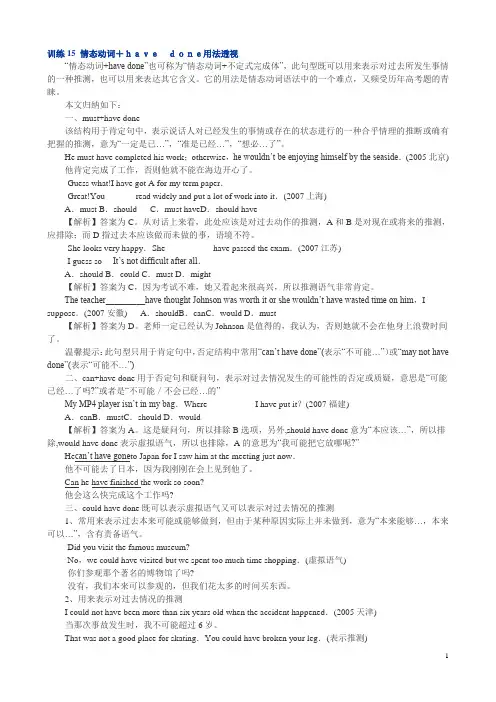
训练15 情态动词+havedone用法透视“情态动词+have done”也可称为“情态动词+不定式完成体”,此句型既可以用来表示对过去所发生事情的一种推测,也可以用来表达其它含义。
它的用法是情态动词语法中的一个难点,又频受历年高考题的青睐。
本文归纳如下:一、must+have done该结构用于肯定句中,表示说话人对已经发生的事情或存在的状态进行的一种合乎情理的推断或确有把握的推测,意为“一定是已…”,“准是已经…”,“想必…了”。
He must have completed his work;otherwise,he wouldn’t be enjoying himself by the seaside.(2005北京) 他肯定完成了工作,否则他就不能在海边开心了。
-Guess what!I have got A for my term paper.-Great!You_______read widely and put a lot of work into it.(2007上海)A.must B.should C.must haveD.should have【解析】答案为C。
从对话上来看,此处应该是对过去动作的推测,A和B是对现在或将来的推测,应排除;而D指过去本应该做而未做的事,语境不符。
-She looks very happy.She___________have passed the exam.(2007江苏)-I guess so It’s not difficult after all.A.should B.could C.must D.might【解析】答案为C,因为考试不难,她又看起来很高兴,所以推测语气非常肯定。
The teacher_________have thought Johnson was worth it or she wouldn’t have wasted time on him,I suppose.(2007安徽) A.shouldB.canC.would D.must【解析】答案为D。
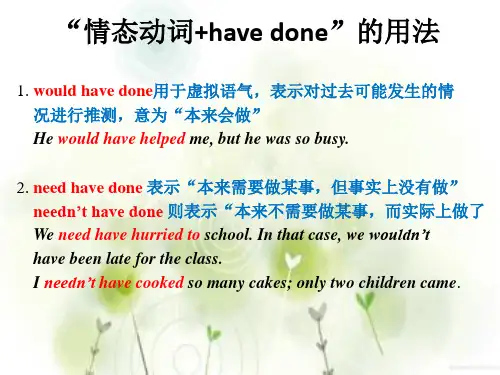
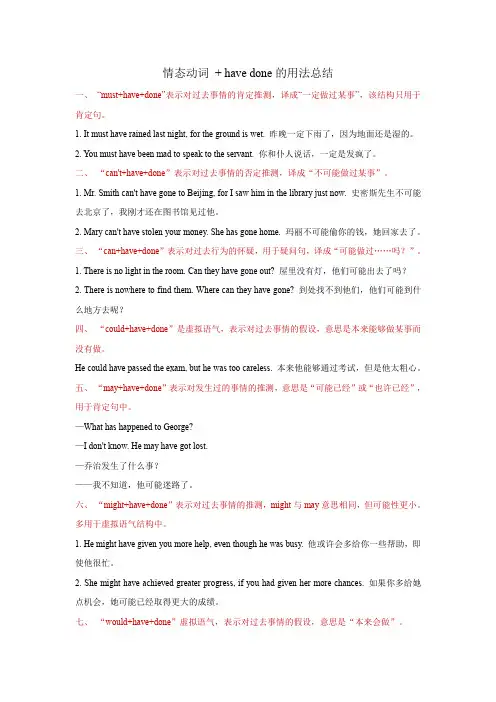
情态动词+ have done的用法总结一、“must+have+done”表示对过去事情的肯定推测,译成“一定做过某事”,该结构只用于肯定句。
1. It must have rained last night, for the ground is wet. 昨晚一定下雨了,因为地面还是湿的。
2. You must have been mad to speak to the servant. 你和仆人说话,一定是发疯了。
二、“can't+have+done”表示对过去事情的否定推测,译成“不可能做过某事”。
1. Mr. Smith can't have gone to Beijing, for I saw him in the library just now. 史密斯先生不可能去北京了,我刚才还在图书馆见过他。
2. Mary can't have stolen your money. She has gone home. 玛丽不可能偷你的钱,她回家去了。
三、“can+have+done”表示对过去行为的怀疑,用于疑问句,译成“可能做过……吗?”。
1. There is no light in the room. Can they have gone out? 屋里没有灯,他们可能出去了吗?2. There is nowhere to find them. Where can they have gone? 到处找不到他们,他们可能到什么地方去呢?四、“could+have+done”是虚拟语气,表示对过去事情的假设,意思是本来能够做某事而没有做。
He could have passed the exam, but he was too careless. 本来他能够通过考试,但是他太粗心。
五、“may+have+done”表示对发生过的事情的推测,意思是“可能已经”或“也许已经”,用于肯定句中。
情态动词+have+done是历年高考的重点和难点之一,现将其用法总结归纳如下:一、“must+have+done”表示对过去事情的肯定推测,译成“一定做过某事”,该结构只用于肯定句。
1. It must have rained last night, for the ground is wet. 昨晚一定下雨了,因为地面还是湿的。
2. You must have been mad to speak to the servant. 你和仆人说话,一定是发疯了。
二、“can't+have+done”表示对过去事情的否定推测,译成“不可能做过某事”。
1. Mr. Smith can't have gone to Beijing, for I saw him in the library just now. 史密斯先生不可能去北京了,我刚才还在图书馆见过他。
2. Mary can't have stolen your money. She has gone home. 玛丽不可能偷你的钱,她回家去了。
三、“can+have+done”表示对过去行为的怀疑,用于疑问句,译成“可能做过……吗?”。
1. There is no light in the room. Can they have gone out? 屋里没有灯,他们可能出去了吗?2. There is nowhere to find them. Where can they have gone? 到处找不到他们,他们可能到什么地方去呢?四、“could+have+done”是虚拟语气,表示对过去事情的假设,意思是本来能够做某事而没有做。
He could have passed the exam, but he was too careless. 本来他能够通过考试,但是他太粗心。
五、“may+have+done”表示对发生过的事情的推测,意思是“可能已经”或“也许已经”,用于肯定句中。
情态动词+have done用法及练习1.must have done 表示对过去或已经发生的行为或状态进行确有把握的推测,意为“肯定做了某事”;只能用在陈述句的肯定句中。
It must have rained last night, for the road is wet.The lights were out. They must have been asleep.2.can’t/couldn’t have done sth.表示对过去或已经发生的行为或状态进行确有把的推意为“不可能做了某事”;只能用在陈述句的否定句中。
He was with me last night. He can’t/ couldn’t have gone to the theatre.I saw Mr. Wang just now. He couldn’t have gone to Beijing.Can/Could …have done sth?表示对过去或已经发生的行为或状态的怀疑.意为“可能已经…吗?”。
用在疑问句中。
He didn’t attend his sister’s birthd ay party. Can/Could he have forgotten it?3.could have done sth.用于陈述句的肯定句中时是虚拟语气,表示没有实现的可能性,意为“本来可以做,可能已经做”。
有一种对过去为付诸实施的事情的惋惜。
用于肯定句中You could have done better, but you were too careless.3.may/might(not)have done sth表示对过去或已经发生的行为或状态进行推测意为“可能(没有)做了某事;只能用在陈述句的肯定和否定句中。
It’s too late. I think he may have gone to bed. He might not have finished the work.5.Should/ought to have done sth表示“本应该做…”而实际上没做Should/ought not to have done sth. 表示“本不应该做”而实际上做了You should have come to the meeting earlier. You ought to have done this exercise .You shouldn’t have told her the truth. He ought not to have treated his parents like that.6.needn’t have done sth.表示做了“本来不必做的事didn’t need to do 表示“没有必要做而实际上也没有做的事“You needn’t have taken a taxi here, for it was very ne ar to my house.I didn’t need to clean the windows. My brother did it.7.had better have done sth.用于事后的建议,含轻微的责备的口吻,意为“当时最好做了某事“,其否定形式had better not have done sth 表达相反的含义。
高二英语情态动词+have done结构用法单选题40题1.She looks so sad. She must have failed in the exam.A.can have failedB.might have failedC.should have failedD.need have failed答案:B。
“must have failed”表示肯定的推测,她一定是考试没及格;“might have failed”表示可能性较小的推测,她可能考试没及格;“should have failed”表示本应该做某事而实际上没做;“need have failed”表示本需要做某事而实际上没做。
题干中她看起来很伤心,推测她可能考试没及格可能性比较合适。
2.The ground is wet. It must have rained last night.A.can have rainedB.might have rainedC.should have rainedD.need have rained答案:B。
“must have rained”表示肯定的推测,昨晚一定下雨了;“might have rained”表示可能性较小的推测,昨晚可能下雨了;“should have rained”表示本应该下雨而实际上没下;“need have rained”表示本需要下雨而实际上没下。
地面是湿的,可能昨晚下雨了比较符合逻辑。
3.He is very tired. He must have worked overtime.A.can have workedB.might have workedC.should have workedD.need have worked答案:B。
“must have worked”表示肯定的推测,他一定加班了;“might have worked”表示可能性较小的推测,他可能加班了;“should have worked”表示本应该加班而实际上没加;“need have worked”表示本需要加班而实际上没加。
情态动词+have+done是历年高考的重点和难点之一,现将其用法总结归纳如下: 一、 “must+have+done”表示对过去事情的肯定推测,译成“一定做过某事”,该结构只用于肯定句。
1. It must have rained last night, for the ground is wet.昨晚一定下雨了,因为地面还是湿的。
2. You must have been mad to speak to the servant. 你和仆人说话,一定是发疯了。
二、 “can't+have+done”表示对过去事情的否定推测,译成“不可能做过某事”。
1. Mr. Smith can't have gone to Beijing, for I saw him in the library just now. 史密斯先生不可能去北京了,我刚才还在图书馆见过他。
2. Mary can't have stolen your money. She has gone home. 玛丽不可能偷你的钱,她回家去了。
三、 “can+have+done”表示对过去行为的怀疑,用于疑问句,译成“可能做过……吗?”。
1. There is no light in the room. Can they have gone out?屋里没有灯,他们可能出去了吗? 2. There is nowhere to find them. Where can they have gone? 到处找不到他们,他们可能到什么地方去呢? 四、 “could+have+done”是虚拟语气,表示对过去事情的假设,意思是本来能够做某事而没有做。
He could have passed the exam, but he was too careless.本来他能够通过考试,但是他太粗心。
五、 “may+have+done”表示对发生过的事情的推测,意思是“可能已经”或“也许已经”,用于肯定句中。
情态动词加have+done的用法“must+have+done”表示对过去事情的肯定推测,译成“一定做过某事”,该结构只用于肯定句。
“can't+have+done”表示对过去事情的否定推测,译成“不可能做过某事”“can+have+done”表示对过去行为的怀疑,用于疑问句,译成“可能做过……吗?”。
情态动词+have+done用法一、“must+have+done”表示对过去事情的肯定推测,译成“一定做过某事”,该结构只用于肯定句。
1. It must have rained last night, for the ground is wet. 昨晚一定下雨了,因为地面还是湿的。
2. You must have been mad to speak to the servant. 你和仆人说话,一定是发疯了。
二、“can't+have+done”表示对过去事情的否定推测,译成“不可能做过某事”。
1. Mr. Smith can't have gone to Beijing, for I saw him in the library just now. 史密斯先生不可能去北京了,我刚才还在图书馆见过他。
2. Mary can't have stolen your money. She has gone home. 玛丽不可能偷你的钱,她回家去了。
三、“can+have+done”表示对过去行为的怀疑,用于疑问句,译成“可能做过……吗?”。
1. There is no light in the room. Can they have gone out? 屋里没有灯,他们可能出去了吗?2. There is nowhere to find them. Where can they have gone? 到处找不到他们,他们可能到什么地方去呢?四、“could+have+done”是虚拟语气,表示对过去事情的假设,意思是本来能够做某事而没有做。